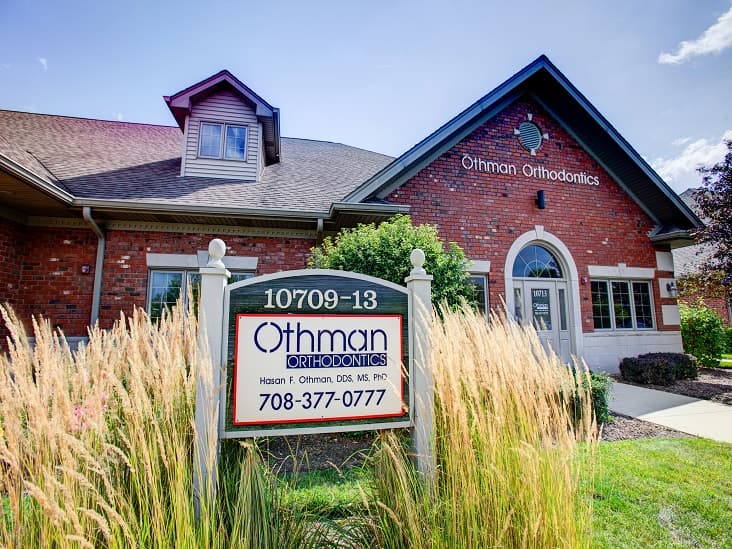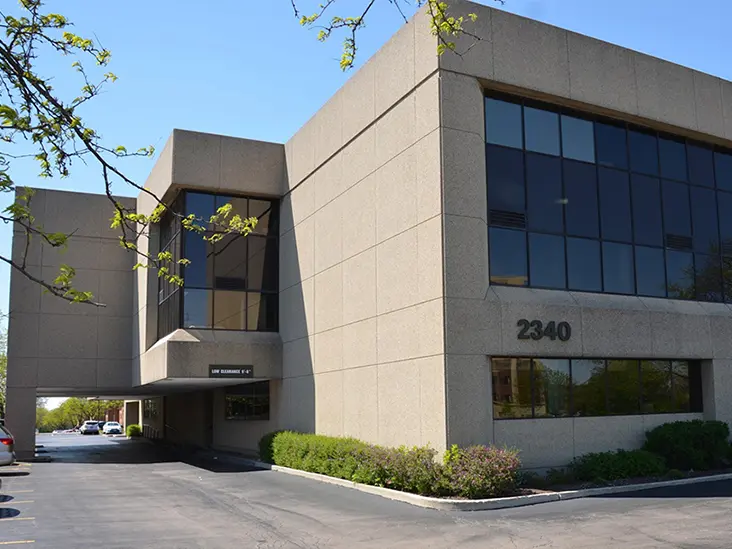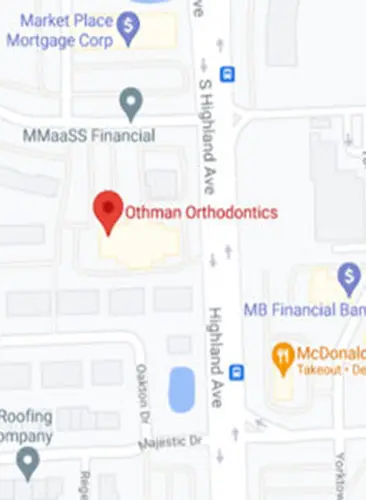frequently asked questions

General FAQ
What is an orthodontist?
An orthodontist is a dentist who specializes in the diagnosis, treatment and prevention of dental and facial irregularities. Orthodontists use braces, aligners and other appliances to align teeth and jaws in order to improve both the function and appearance of a patient’s smile.
Why should I see Othman orthodontics?
There are many reasons to visit an orthodontist. Maybe your child has a problem with their teeth or jaw, or maybe you’re not happy with the way your own smile looks. Orthodontic treatment can improve both the function and appearance of your teeth, and can also help to prevent future problems with your oral health.
| Othman Orthodontics | 2340 S Highland Ave | Ste 300 | Lombard | 60148 | IL | US |
| Othman Orthodontics | 10709 Winterset Dr | Orland Park | 60467 | IL | US |
What types of treatments do you offer at OthmanOrthodontics?
Othman Orthodontics offers a variety of different treatments, depending on the specific needs of the patient. The most common type of treatment is braces and aligners, which are used to straighten teeth. We offer clear, colored, and incognito braces. We also offer clear aligners such as Invisalign® and Spark aligners which includes multiple sets of clear plastic aligners that gradually move your teeth over the course of your treatment. Other types of treatments include retainers, which are used to keep teeth in place after they have been straightened.
Can I use a rubber band to fix my turned tooth?
No, you should never attempt to fix your own teeth with a rubber band or any other type of
DIY methods. This could damage your teeth further and cause you more pain. You can
always call our office and schedule a complimentary orthodontic consultation.
What’s the best age to visit the orthodontist?
The American Association of Orthodontists (AAO) recommends that children first visit the
orthodontist around age 7. This is because at this age, many orthodontic problems are just
beginning to develop, and can be more easily corrected. However, every child is different,
and some may need to visit the orthodontist earlier or later than age 7. If you are concerned
about your child’s teeth, it is best to schedule a consultation with an orthodontist. They will
be able to tell you if treatment is necessary, and if so, when the best time for treatment would
be.
Am I too old for orthodontic treatment?
No, you are never too old for orthodontic treatment. Orthodontic treatment can be successful
at any age. The determining factor is your overall health and the health of your oral cavity.
How long does treatment usually take?
Treatment times will vary depending on the individual patient and the severity of their
condition.
Will I need to wear a retainer after my treatment is finished?
It is common for patients to need to wear a retainer after their orthodontic treatment is
completed. This is necessary in order to keep the teeth in their new, straight position. The
length of time that you will need to wear a retainer will vary, but it is typically recommended
that you wear it for at least a few years after your treatment is finished.
What are the risks involved with orthodontic treatment?
Orthodontic treatment is generally considered to be safe. There are, however, a few risks
involved with any type of dental or medical treatment. These risks include infection, irritation
of the gums and teeth, and damage to the teeth. Overall, however, the risks associated with
orthodontic treatment are very low
My orthodontist says I have a malocclusion? What is that?
“Malocclusion” comes from the Latin term that means “bad bite.” Orthodontists use this word
to describe teeth that do not fit together properly
I’m interested in getting Invisalign® or Clear Aligners What isthe first step?
If you are interested in getting Invisalign® or Clear Aligners the first step is to schedule a
consultation with an orthodontist. During your consultation, the orthodontist will do a
comprehensive examination, and if required, take X-rays in order to determine if Invisalign®
or Clear Aligners is the right treatment for you. If the orthodontist does recommend
Invisalign®, they will discuss an Invisalign® treatment plan that is right for you
I’m interested in getting braces. What is the first step?
If you are interested in getting braces, the first step is to schedule a consultation with an
orthodontist. During your consultation, the orthodontist will examine your teeth and jaws, and
if required, take X-rays in order to determine if braces are the right treatment for you. If the
orthodontist does recommend braces, they will discuss the different types of tgreatment
options that are available(clear, incognito, colored , aligners), and will help you to choose the
type of treatment that is right for you.
Payment & Insurance FAQ
How much does orthodontic treatment cost?
The cost of orthodontic treatment will vary depending on the individual patient and the
severity of their condition. Some insurance plans may cover a portion of the cost of
orthodontic treatment.
Will my insurance pay for my orthodontic treatment?
Your insurance company may cover a portion of the cost of your orthodontic treatment. We
are happy to work with your insurance company to help you receive the maximum benefits
available.
Do I have to have insurance to have orthodontic treatment?
No, you do not need insurance to have orthodontic treatment. However, many insurance
plans do cover orthodontic treatment, and we are happy to work with you and your insurance
company to help maximize your benefits. If you do not have insurance, or if your insurance
does not cover orthodontic treatment, we do have financing options available to make
treatment affordable for you and your family.
Are orthodontic expenses tax deductible as a medicalexpense?
Yes, orthodontic expenses are considered a medical expense and can be tax deductible.
However, there are certain requirements that must be met in order to qualify for the
deduction. For more information on how to qualify, please speak to your accountant or tax
professional.
You can also take advantage of an employer benefit known as a FSA (flexible spending
account) to pay for some or all of their orthodontic costs. FSAs, which are funded using
pre-tax money, have a yearly limit. Check with your employer to see if you qualify for this
benefit.
Treatment FAQ
Which treatment is the best and fastest?
There is no definitive answer to this question as it depends on the individual case. At
Othman Orthodontics we use state of the art technology so that we can provide our patients
with the best and fastest possible treatment options and results. One type is not consistently
faster than the other as it depends on many factors. To ensure you get the bestt results,
make sure you follow your orthodontist’s tips for brushing, flossing, professional cleanings,
and diets; and keep all your appointments with your orthodontist on time.
My retainer has disappeared. What should I do now?
Contact your orthodontist ASAP to get a replacement retainer. Teeth will eventually move if
you stop wearing your retainer.
I only want braces on my top teeth, is that an option?
To answer this question accurately, we recommend speaking to Dr Othman as each case is
unique.
Can I get braces if I’m missing some teeth?
Yes, you can still get braces even if you’re missing some teeth. Depending on your
circumstances and treatment goals, it’s conceivable that you may have successful
orthodontic therapy if some teeth are missing. Orthodontic treatment can usually close the
gap left by a lost tooth or generate or preserve enough space for a replacement tooth/teeth.
Can I get braces if my teeth have crowns or root canals?
If your teeth have crowns or root canals, you may benefit from orthodontic therapy. Brackets
may be attached to crowns in the same way that they’d be any other tooth. For answers that
are unique to you and your circumstances, book a consultation with Dr. Othman today.
Can I speed up my treatment by wearing extra rubber bands?
No, wearing extra rubber bands will not speed up your treatment. In fact, since the additional
force may move your teeth in an undesired way, you might extend your treatment by wearing
extra rubber bands.
Can I get my braces off in time for a big event?
Yes. If you have a big event we make the exception and take braces off temporarily.
What is bonding?
Bonding is the name used for the process of attaching brackets to teeth using an adhesive.
How often will I have appointments with my orthodontist duringmy treatment?
The orthodontist will typically see you every six to ten weeks during treatment, which allows
them to make the required adjustments to proceed through therapy and also keep an eye on
your dental health.
I see ads for perfect teeth in only one or two visits to the dentist. How is orthodontic treatment different?
Veneers are a popular yet, NOT recommended, choice to straighten your teeth. They hide
the problem and conceal it, and they don’t address the structure of the mouth or how the top
and bottom teeth meet. Veneers aren’t permanent. Many need extensive amounts of tooth
enamel to be removed. If plaque builds up where the veneer and remaining natural tooth
meet, it can cause decay.
Orthodontic treatment is a process that uses braces or other appliances to move teeth into
their proper positions. By aligning the teeth and jaws, orthodontics can improve both your
appearance and your dental health. This is why orthodontic treatment usually takes longer
than getting veneers.
Can you get braces while you are pregnant?
It’s possible to start therapy while you’re pregnant, but it’s crucial to talk about this with your
OBGYN/physician/healthcare provider and orthodontist before beginning any orthodontic
treatment, since pregnancy entails physiological changes that might impact the mouth.
How can I take care of my teeth if I’m wearing braces or aretainer?
It’s important to take good care of your teeth when you’re wearing braces or a retainer, in
order to avoid problems such as tooth decay or gum disease. Here are some tips for taking
care of your teeth:
- Brush your teeth at least twice a day, using a toothbrush with soft bristles.
- Floss your teeth at least once a day.
- Avoid sugary and acidic foods and drinks, as they can damage your teeth.
- Visit your orthodontist regularly for checkups and cleanings.
Can I drink soda pop with my braces?
We recommend that patients limit their intake of any drinks with added sugar, including soda
pop (even diet), energy drinks, sweet tea, some juices and sports drinks during their
treatment. These drinks contain acid and sugar that can promote tooth decay. When patients
must drink soda pop, we recommend using a straw to help avoid contact with the teeth.
One of the wires is poking my cheek. What should I do?
Push the wire so that it is flat against the tooth using a Q-tip or pencil eraser. If the wire
cannot be moved into a comfortable position, cover it with orthodontic wax. You may need to
be seen by our orthodontist so contact us as soon as possible
Can I get a tongue or lip piercing? What are the risks?
There are risks associated with oral piercings, including damage to the tongue, cheeks, lips
or uvula (the tissue at the back of the throat). Tongue piercings in particular can permanently
damage your teeth by wearing away the enamel, or by chipping or cracking teeth.



